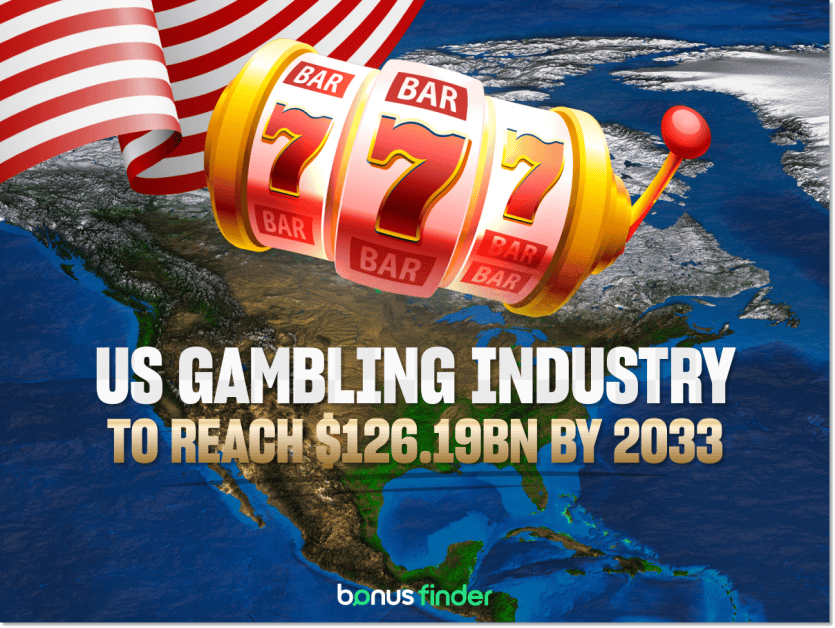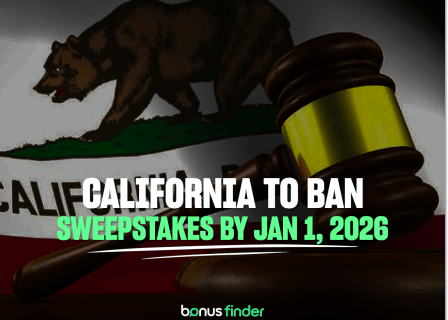ResearchAndMarkets’ latest report suggests substantial growth within the US online gambling market – mainly made up of sports betting and online casinos – which will rise from 2024’s $75.65bn to an expected $126.19bn by 2033.
The report highlights continued regulatory expansion, as well as an improvement in online casino websites and continued growth in demand.
US gambling continues to see growth across various metrics. At the same time, iGaming, or online casino gambling, has also emerged as a major contender, albeit only currently in the seven states where it has been regulated.
As a result of this growth, the industry was worth $75.65bn in 2024. According to the most recent study from ResearchAndMarkets, the industry is expected to see a Compound Annual Growth Rate (CAGR) of 5.85% between 2025 and 2033, resulting in an industry worth $126.19bn within just eight years.
Growth drivers in gambling for 2033
There are various key areas that will drive this potential growth. Some states, like New York, will increase the number of retail casinos they have, and it is highly likely that the number of states with legalized online casinos will expand during the next eight too.
The expansion of existing sites will not only see the gambling industry boom but will also bring further benefits to additional industries like tourism and hospitality.
Regulatory growth by 2033
Currently, 38 states offer regulated gambling, including retail and online casinos as well as sports betting. This includes just seven states that have regulated online casino gambling:
- Connecticut
- Delaware
- Michigan
- New Jersey
- Pennsylvania
- Rhode Island
- West Virginia
Nevada also allows online poker, but does not allow other forms of iGaming, meanwhile sports betting (in some form) has been legalized in 40 states.
The fight to legalize online casinos across the USA
For states to regulate online gambling, it typically requires legislation to be passed through lawmakers, and then it has to go to a public ballot. The process can take several years, but at least in some states, that process has already begun.
Rhode Island was the last state to regulate online casinos. States including Illinois, Massachusetts, New Hampshire and Maine are among the frontrunners believed to be considering or debating online casino gambling next.
New York is also believed to be considering it, but lawmakers are in the process of awarding new retail casino licenses, which may slow or even prevent the move.
Advancing technology being a growth factor of online casinos
InterCasino, which is widely considered the first online casino, launched in 1996. The early 2000s saw a significant increase in the number of casinos and the number of online casino players, and the industry’s growth has continued, especially thanks to improved mobile hardware and mobile Internet connections.
Additionally, 5G technology has further improved accessibility and the introduction of 6G is expected to be the turn of the Century and will mean further technological improvements.
From a user standpoint, more immersive gaming has also been introduced. Live dealer games are proving popular, and we’re starting to see the introduction of virtual reality casino gaming, too.
Cryptocurrency and blockchain are other areas that could drive further expansion with greater privacy and anonymity, faster payments, and provably fair gaming being some of the benefits to potentially attract players.
Growth in tourism and casino resorts
Modern casinos can incorporate much more than just slot machines and table games… Resorts, which include hotel rooms, expansive function space, entertainment venues, and other areas, are commonplace on the Las Vegas Strip. They are also popular in destinations like Macao and Singapore.
Not only do these venues bring additional gambling revenue because they attract holidaymakers, and guests who stay for several nights, but they also bring additional benefits to state taxes, and therefore the community as a whole.
New York is currently in the process of issuing up to three new licenses for casinos. Four casinos have made it to the final stages of the bidding process, and they all include: a hotel, entertainment, retail or other spaces and more. These resorts are:
- Resorts World New York, Queens
- MGM Empire City, Yonkers
- Bally’s, Bronx
- Metropolitan Park, Queens
Depending on the success of these ventures, other major cities and states may also consider awarding new licenses for casino complexes, which could offer significant potential revenue increases.
Challenges and tribulations for the US gambling industry
Although there is significant scope for growth, the US casino gambling industry does face significant challenges. Regulatory challenges will continue to exist, especially driven by concerns regarding problem gambling, while Las Vegas is experiencing a downturn in visitor numbers.
Regulatory difficulties
In 2018, the Supreme Court overruled the Professional and Amateur Sports Protection Act (PASPA) of 1992 and effectively enabled states to individually determine their own online gambling regulations.
Since then, 34 states have legalized online sports betting, but only seven have regulated online casino gambling. And every state has different, in some cases wildly different, regulations.
Typically, a bill needs to be drafted and put forward before gaining approval from both State Houses. Then, it needs to gain public approval via a public ballot.
Bills can take several rounds of negotiation and amendments, and it can take years before proposals reach the public ballot.
As several states have legalized iGaming industries, frameworks and precedents do exist, but the process is still fraught with challenges and barriers.
We also need to consider regulatory changes in sweepstakes casinos, prediction market betting, and cryptocurrencies, as these will impact the gaming industry as a whole too.
Problem gambling
One of the main arguments against the regulation of gambling, or the expansion of existing gambling laws, is the prevalence of problem gambling and societal issues.
The government, state bodies, and gaming commissions take problem gambling regulations seriously, with punitive action taken against companies that don’t meet safer gambling requirements.
Gambling companies need to invest considerable money in responsible gambling measures while showing they take their societal requirements seriously.
Las Vegas difficulties on the Strip
Evidence suggests that casino gambling, in particular, is not as negatively impacted by recessions and economic downturns as other industries. However, industry growth slows, at the very least, during times of economic uncertainty.
And, as has been witnessed in Las Vegas, while gambling revenue figures might not take a hit, other related figures do.
The Entertainment Capital Of The World has seen dwindling visitor numbers, which means continued periods of financial difficulties could negatively impact expected growth. Lately, the Golden Gate Casino on the Strip – also the oldest casino – replaced their entire first floor of dealers into AI ETGs – reflecting a decline in land-based gambling within the USA’s casino hotspot.









